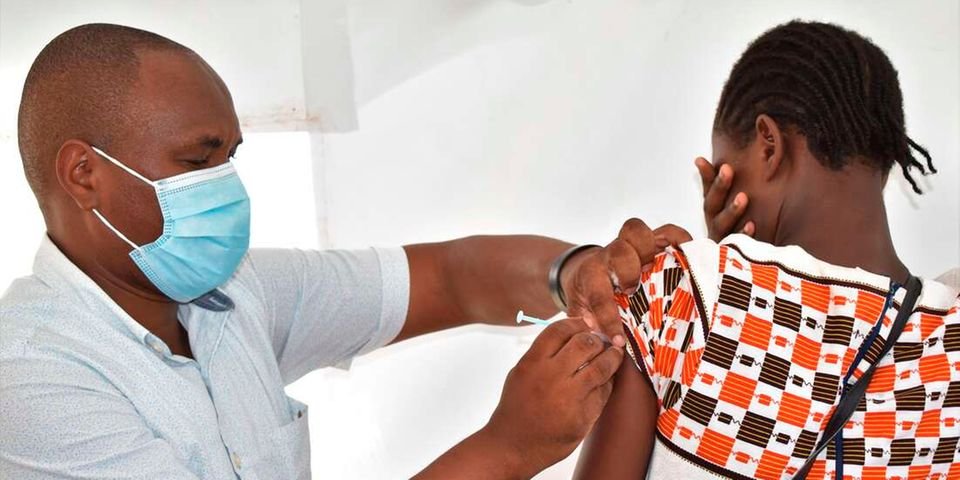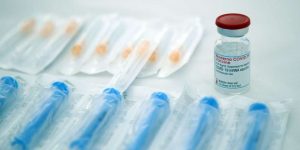Report: Only 7 per cent of Africans have been vaccinated against Covid-19

A huge gap exists between Africans willing to receive the Covid-19 jab and those who have actually been vaccinated, even as the Omicron variant spreads across the world, a new survey has disclosed.
According to the study conducted by the Partnership for Evidence-Based Response to COVID-19 (PERC), less than seven per cent of Africans had been vaccinated by November 2021 despite 78 per cent of them being willing to receive the Covid-19 vaccine.
“Vaccine hesitancy is not a top challenge on the African continent. More than three in four respondents indicated that they had been vaccinated or were likely to get vaccinated against COVID-19. In Guinea, Morocco, Mozambique, Tunisia and Zimbabwe, this figure was 90 per cent or higher,” the research findings show.
The study, which involved approximately 23,000 people across 19 African countries between September 10 and October 4, 2021 demonstrates a substantial unmet need, underscoring the importance of consistent and predictable vaccine supply and increased support for vaccination programs in Africa.
It highlights how vaccination efforts in the continent have been plagued by inequity, as well as logistical challenges.
Preventive measures
The report further outlines the continued importance of preventive measures such as masking and social distancing that minimize the social or economic harm that can occur when mobility, economic and social gathering restrictions are imposed.
“We must work urgently toward equitable access to safe and effective vaccines on the African continent. PERC data shows that demand for vaccines is substantially higher than supply,” said Dr John Nkengasong, Director of the Africa Centres for Disease Control and Prevention.
At 78 per cent, vaccine acceptance was higher than in the previous PERC survey fielded earlier this year (67 per cent), which may indicate the success of risk communication campaigns.
Vaccine acceptance was high among both those who trusted their government’s pandemic response and those who felt COVID-19 posed a personal risk to them or to their country.
Among the 20 per cent of respondents who expressed vaccine hesitancy, the top reasons were low risk perception (24 per cent), lack of enough information about vaccines (22 per cent) and lack of trust in government communication at 17 per cent.
The reasons for low risk perception remain complex, the report points out, but officials can take concrete action to address them. Offering more and better information to people about Covid- 19 and vaccines through trusted sources, coupled with consistent and reliable vaccine supply, could further increase acceptance.
Respondents’ top information sources include local health centers, television and radio, according to the survey.
It identifies unpredictable vaccine supply in terms of volume, timing and shelf life as one bottleneck that has led to low vaccination coverage. The report says when offered, vaccination is frequently inconvenient, requiring people to travel far distances or visit vaccination sites at inopportune times.
“I am heartened by the efforts of the African Vaccine Acquisition Trust (AVAT) and the COVAX facility to expand vaccine access,” said Amanda McClelland, Senior Vice President of Prevent Epidemics at Resolve to Save Lives, an initiative of Vital Strategies.
Unemployment
“But there is still work to do. Vaccine donations sent too close to expiry dates, for example, leave countries unable to launch effective vaccination campaigns.”
Unemployment and food insecurity were widespread among survey respondents and made adherence to restrictive community measures a challenge.
PERC researchers concluded that such measures should be targeted to specific, high-risk populations as needed to minimise harm.
Income loss also may have had an adverse impact on access to essential health services. Cost and affordability were cited as the primary obstacles to receiving care.
Declines in the number of health visits have likely contributed to declines across key health indicators. PERC researchers advocate for urgent investment to stabilize health systems and regain progress lost during the pandemic.
“The PERC data enable policymakers to both save lives and minimize impacts on livelihoods,” said Dr. Tom Frieden, President and CEO of Resolve to Save Lives, an initiative of Vital Strategies.
“The global community has an opportunity to invest in health care workers and public health infrastructure to support vaccine delivery and COVID-19 care and prevention in the near term, and also repair and restore health service delivery disrupted by COVID-19 for the long term.”
The report emphasizes on the need to prioritize epidemiological data, contextual data and data on community perceptions and actions towards countermeasures for disease mitigation and prevention.
“Together with the data itself, timely collection, analysis and dissemination are integral to systems strengthening and emergency response.”
It also calls on the global community to support African countries in supplying vaccines at a better coordinated and more systematic pace to allow broader, more effective and equitable distribution.
Resources and expertise to support vaccine delivery must be part of the supply machinery to ensure coverage, the report recommends.
“Covid-19 preventive measures are critical to mitigate transmission, particularly as new, possibly more transmissible, variants emerge in under-vaccinated populations. Promoting adherence must remain a top priority,” says the research.



